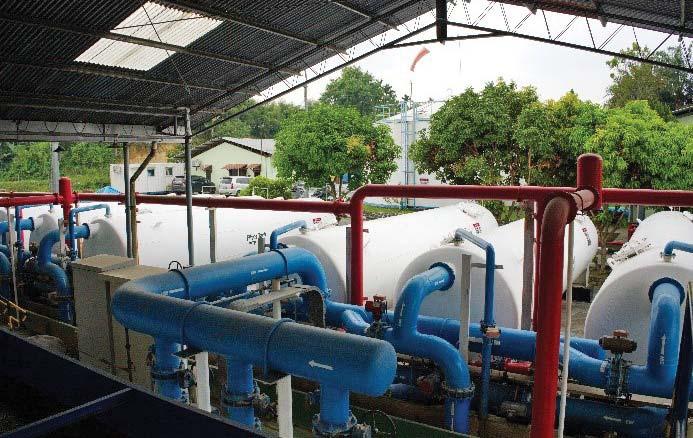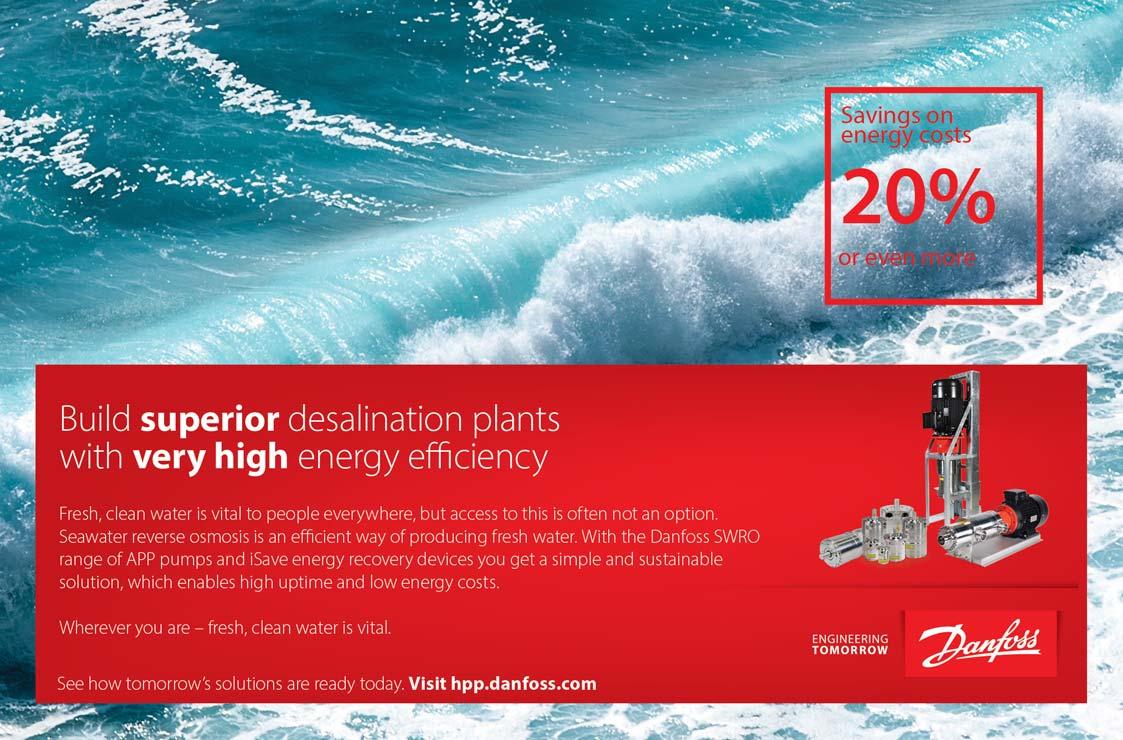
6 minute read
SUEZ modular water treatment plants in urban water systems
By Nuno Aguilar, Global Sales & Marketing Director, SUEZ

Advertisement
SUEZ develops modular water and wastewater treatment plants which can be used as a solution to some of the challenges that operators or water utilities face today


Today, nearly 55 per cent of the world population lives in urban areas. This number is expected to rise to nearly 70 per cent in 30 years. This fact is not only the result of a gradual shift from the rural populations to urban areas, but also the population growth that is expected to grow per cent until 2050. These facts aligned with the climate change generate an extreme pressure on the existent facilities and systems in urban areas (Transport & Mobility, Water & Energy, Production and Distribution, Waste management & Recycling, etc.). The current models of resource consumption need to be adapted in order to accommodate these changes.
The use of new materials, recycling, water reuse but also the change of habits will create more efficient systems that will certainly come to replace the old ones. These disruptions are common in human history and are the proof that humanity knew how to adapt to its changing environment.
But these impacts create, also, a huge need for new infrastructures, and with this will bring the same questions about how to fi nance their construction and how to fund their operation and maintenance.
In order to attain the SDG (Sustainable Development Goals) at a good pace, in particular, the one related to Water and Sanitation, new solutions that are simpler, aff ordable and reliable are needed. This point is mentioned in the report “A New Model for Water Access” created by the Global Water Leaders Group where it is stated that for the new model, decentralistion is a potential solution, “Decentralise to cut the up-front capital costs: water kiosks, franchised water distribution services, micro-utilities, and neighborhood wastewater treatment facilities may not off er the perfect solution, but they do off er a better and more aff ordable solution in the interim.”
Today, decentralised solutions, like modular and packaged systems for water and wastewater treatment, are becoming more and more a solution, not only for rural areas where its application is quite obvious due to the geographical context but also in urban areas (new neighborhoods or city extension) with more high-density population, because they more flexible, and time and cost effi cient.
As a bonus point, they improve the water safety plans for the operators as they can be used to diversify water sources (if that is the case), in the example for drinking water source, but also more flexibility and redundancy which are critical for the operators to not depend on a unique major system, thus reinforcing the resilience towards disruption risks.
UCD: DEGRÉMONT ® COMPACT UNITS
SUEZ is a leading services provider in water and waste management. SUEZ develops modular water treatment plants (WTP) and wastewater treatment plants (WWTP) that can be used as a solution to some of the challenges that operators or water utilities face today.
The UCD (Degrémont ® Compact Units) are prefabricated, modular water and wastewater treatment plants that were developed by SUEZ and were engineered in order to be easily produced, transported and deployed.
For drinking water application there are fi ve modules that cover water technology processes such as Lamellar Settling, Sand Filtration, Dissolved Air Flotation (DAF) or stripping towers - Aero G & Aero F (for removal of ground water contaminants as iron, carbon dioxide or hydrogen sulfi de) that can be adapted to treat conventional water sources of fresh water like rivers, dams, lakes or underground water. The capacities go up to 22 MLD per module.
For wastewater application there are four modules with diff erent types of technologies from the conventional activated sludge, Sequential batch reactor, moving bed biofi lm reactor (MBBR) and membrane bioreactor that can cover the wastewater treatment of a population of up to 30000 PE (Population Equivalent).
There is a large field of application possibilities for these modular systems in the reinforcement of the capacity of water production or wastewater treatment for some neighborhoods in urban areas as the cities grow. This fact is particularly pertinent in some areas like Africa or in Southeast Asia where the rate of the population growth is higher.
COMPLEMENTARY SYSTEMS
The use of modular systems is complementary to conventional water systems where fl exibility is achieved. A good example is the case of a conventional system upgrade where modular systems can be installed to assure the continuity of service during the extension works.
An example is the possibility to reinforce the capacity of a WTP with a new treatment step or technology at some point due to external changes in the raw water (this case is common in some rivers where rain/dry seasons alters the raw water composition) but only for a short period of time.
Another example linked to water sources is the need for investment in alternative systems (e.g. desalination of sea water) due to a sudden episode where there is a lack of fresh water to feed the existing freshwater treatment systems (e.g. Melbourne, Barcelona and Cape Town). These systems will complement the existing ones, even if their operation is very limited (if there is enough fresh water), but, if needed, they are there to assure the continuity of the service. Applying modular solutions in such cases will help to reduce CAPEX and OPEX costs.
In 2012, SUEZ installed an UCD LML modular WTP in Kalabancoro – Bamako
(Mali). This WTP was deployed in 10 months and is capable of producing 22,000m 3 / day. Since then, it has served the Bamako city’s water needs by treating water from the Niger River. This year, the new WTP of Kabala was inaugurated — designed and built by SUEZ, it will assure the production of 300,000m 3 /day by treating the water from the same river. This serves as a good example for complementary and redundancy of both systems: In order to rapidly assure the availability of drinking water for the population, one modular solution was put in place at some point to complement the traditional one. The project development time (structuring, fi nancing, etc.) of this major project sometimes was not compatible with the immediate population needs for water. The advantages of the Modular Standard systems can be resumed in: • Optimised lead time: Factory assembled and wired • Modularity: Addition of modules, inter- changeable units and transfer is possible • Compact: Reduced footprint - installation in dense areas • Risk management: Factory tested - Limited structural engineering • Reduced CAPEX and OPEX: Civil engineering and operating costs reduced
PROVEN IN SOUTHEAST ASIA
Since 2001, SUEZ through its subsidiary PT Tirta Lyonnaise Medan (TLM), has been operating a WTP in Medan, Indonesia, under a BOT contract to provide bulk water for the region. The original system consisted of three UCD LML modules and was built between 2001 and 2003 with a total of 500l/s. A new extension of the water treatment plant, signed in 2018, was completed by adding two new modules of UCD LML to upgrade the system to produce a total of 900l/s.
Decentralised, modular and compact solutions for water and wastewater treatments can be a complementary solution to conventional systems. They are easily and rapidly deployed, based on reliable technologies, cost-effective and easy to operate. They allow phased investment due to its modularity, and can reinforce operators water safety plans as well as ensure resilience in urban water systems. WWA











